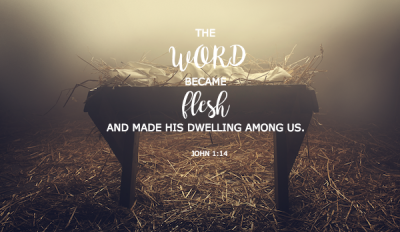The meal in a manger
John 1:14 The Word became flesh and dwelled
among us.
Over the years, I
have talked to lots of pastors and people about the benefits and blessings of
celebrating the Lord’s Supper every Sunday. I tell people that at Epiphany we
celebrate communion not just on Sundays, but also festival services like Epiphany,
Ascension, Thanksgiving and Christmas Day.
At one point I was
asked why we receive the Lord’s Supper on Christmas morning This dear person
felt it was a little strange for a service celebrating the birth of Jesus to
transition into receiving this baby’s body and blood. And I get it — the
juxtaposition is a bit jarring.
Christmas is a
celebration of life. The very Word of God “became flesh and dwelled among
us” (John 1:14). Our hymns this morning are filled with hope and joy. We
exchange gifts with those we love in remembrance of God giving us the gift of himself
in the Christchild. We have nativities set up with angels, Mary, Joseph, humble
shepherds, and wise travelers all gathered around this infant-God lying in a
manger. That’s right — in a manger.
A manger is a feeding
trough. It comes from the Latin word “manducare” meaning “to
eat.” And the town where this particular manger was located was Bethlehem,
which means “House of Bread.” Jesus later refers to himself by saying, “I
am the bread of life” (John 6:35) and “I am the bread that came down
from heaven” (John 6:41).
The Bread of Life
comes down to the House of Bread to be placed in a manger. So yes, the Creator
of all things makes himself lowly, to the point of being placed in a feeding trough
where dirty animals come to eat.
Those animals do not
come to prepare a meal, but rather to receive what has been prepared for them.
They come there to be fed. The poor shepherds are there, too. And hosts of
angels are there. All gathered around the humblest of tables where the Bread of
Life, come down from heaven, has been laid out.
The same body that
will be broken in crucifixion for the forgiveness of our sins is first laid in
a manger. The Holy God of all that is, laying in a wooden box like a meal for sheep.
A feast for sinners. A banquet for beggars. The image is striking and
admittedly scandalous.
People were utterly scandalized
when Jesus later said, “Whoever eats my flesh and drinks my blood will
live forever” (John 6:52-58). Thankfully he did not misspeak. He was
making us a promise — a promise that has been hinted at since that very first
Christmas night. A promise on display in each nativity scene we set up. And
it’s a promise he makes good on every time we receive his holy Supper.
We come to the Lord’s
altar every week and every festival service to be fed. We come to receive what
has been prepared for us. We are sheep coming to eat from what our Good Shepherd
has laid out for us. We are sinners waiting for the feast of salvation. We are hungry
beggars awaiting the banquet set before us.
It is a mystery that
the Word became flesh. It is a mystery that Christ’s flesh and blood are hidden
in, with and under the bread and wine of the Lord’s Supper! What a mystery!
What an honor! Every time you receive the Sacrament, you have a personal, physical
encounter with the Son of God. You have forgiveness on your lips. Salvation on
your tongue. Taste and see that the Lord is good (Psalm 34:8).
Whether we kneel
together at the communion rail or receive communion through continuous distribution,
we eat and drink this Sacrament together. When we commune with our brothers and
sisters in Christ, we are not condoning their sins any more than they are condoning
ours. Jesus gives us his body and blood for the remission of sins, not for the
defense of them. The forgiveness we receive from the body and blood of Jesus is
the same forgiveness our brothers and sisters in Christ receive. At the altar,
God joins us together as one – bound to each other by sharing the same body and
blood, the same forgiveness of sins, the same peace with God that surpasses all
understanding.
The truth is
everything about Jesus’ birth quietly points to the extraordinary and humble
way he intends to keep coming to us. In a very real way, every time we receive
the Lord’s Supper, we are experiencing Christmas all over again. The Word
became flesh for us, this bread from heaven gifting himself to us sinners again
and again. He is the reason why we keep the “mass” in Christmas.
When we recall the harmony
of the Word becoming flesh and being placed in a manger and the flesh and blood
Son of God being placed on the altar, why wouldn’t we want to receive the
Sacrament on Christmas morning? This is a meal that is prepared for us. It is a
meal we share with our brothers and sisters in the faith. It is a meal of
forgiveness through the Christchild laid in a manger, so he could be the Christ
laid on the cross, so he could be the Christ risen from the grave, so he could
be the Christ laid on the altar.
The Bread of Life laid
in manger in the House of Bread.
The Bread of Life laid
on the altar in the House of the Lord.
Eat, drink, and be
forgiven — and Merry Christmas! Amen.

Comments
Post a Comment